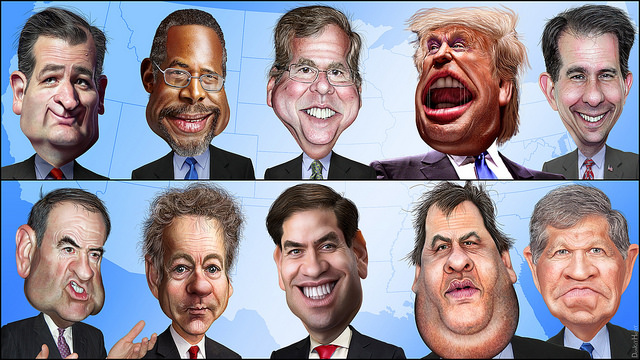Two Cents on the GOP “Debates”

Philosophy, story-telling and the politics of irrationalism—those are the three interesting features that stood out in the Nov. 10 GOP presidential debate in Milwaukee.
The eight candidates, in the course of free-for-all argument, fell out into three clusters—front runners Donald Trump and Ben Carson as the rightwing populists, a second string of Marco Rubio, Carly Fiorina and Ted Cruz as the Neocon hawks, and the third tier of Jeb Bush, Rand Paul and John Kasich as an odd lot of more traditional Republicans from an earlier age.
I wouldn’t pick out any clear winners or losers in this round. Everyone more or less managed to maintain their current status in the pecking orders set up by the pollsters. There were no knockout blows or major failures, at least in their own terms. Nor was there any sustained revolt against the moderators.
But one early comment by Rubio got my juices flowing. Speaking about vocational education, he said that welders make more money than philosophers, and thus we need more welders. Of course, with my degree in philosophy and my certifications as a computer hardware tech, if not as a welder, I have some skin in this matter. First, the country already has far more welders than philosophers, with the latter hardly being able to maintain small niches in the universities. Shrink them any more, and you’ll have to go abroad to study the subject. Second, every job I’ve ever had has been enhanced by the critical thinking skills I gained as a philosophy student.
But what Rubio was doing was typical of the evening. First, he was telling little stories with a faux concreteness—everyone has seen a welder at work—to make selling point. Second, it didn’t matter if the stories were true; what mattered was whether they could “connect.” And third, they appealed to the more backward and irrational features of the American experience and character, in this case, anti-intellectualism. (In fact, political philosophers were dis-proportionally represented among the founders of our country).
This was typical, however, of all the candidates. The unfolding of the “debate as spectacle” was really an exercise in postmodernism, an approach to ideas that discounts reason and reality in favor of storytelling and narrative. Whether the stories are true or not, in postmodernism, is really beside the point. What matters is if they “communicate.”
What stories do people like to hear in electoral debates? Stories about jobs and growth, especially “good” jobs like welders and new small businesses. How will we get jobs? Cut our taxes and get rid of pesky regulations. Don’t increase the minimum wage. Do away with the Deptment of Commerce and the Internal Revenue Service (IRS). Make everyone pay a 14% income tax rate. (Most taxpayers now pay a higher rate, although many big businesses pay zero, hence the populist appeal.)
Of course, none of this makes any economic sense at all, and never has. But it’s a GOP postmodern narrative. It doesn’t have to make any sense. Trump does the same thing with immigration, claiming he will deport some 11 million people. Both Kasich and Bush called him out on it, asserting that it was an impossibility. It didn’t matter. Trump answered with a ‘story’ about Eisenhower and the handling of a million braceros in the 1950s. It didn’t make any rational sense, but it allowed Trump to re-assert dominance and “communicate.”
Nearly everyone told Neocon war-mongering stories on how aggressive they would be against Putin, ISIS and China, especially Fiorina and Rubio. Trump blustered a lot, but backed off a bit about invading Syria, arguing he’d get others to do the fighting. Anyone serious about U.S. national security, even from the point of view of Empire, was probably rolling their eyes. Only Rand Paul, the libertarian with a bias toward non-intervention, noted the irony, pointing out that when it came to the military and war spending, they were all militant liberal Keynesians.
And so it goes. The “meta-story,” to use a postmodernist term, is that the stage was filled with champions of the working class and expanding the middle class, all ready to overthrow the tyranny imposed on the spunky entrepreneurs plugging away in their suburban garages. They were all likewise champions of the poor, ready to free them from the bondage of increases in the minimum wage and their new access to health care.
It’s not supposed to make sense or be true. It‘s just supposed to “get over.”
Now in the next round, let’s see how well we can all do at “deconstruction,” another tool of the postmodern academy. With a little effort, maybe we can all become philosophers, but more organic to our class, where we prefer truths over stories. If not, there's always welding school.

